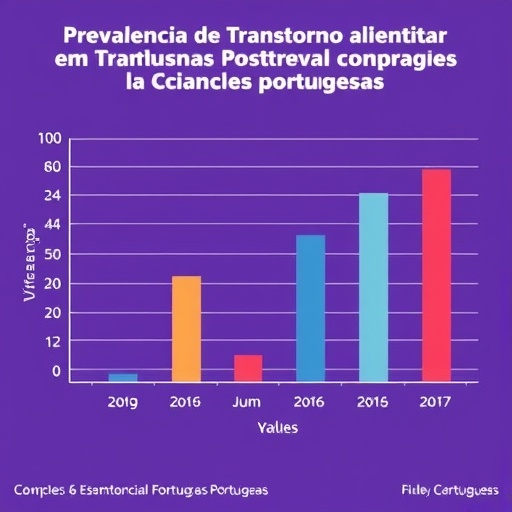In recent years, there has been a growing awareness of a condition that has long been under-identified and misunderstood: Avoidant/Restrictive Food Intake Disorder (ARFID). Characterized by restricted eating, this disorder can manifest in ways that significantly affect an individual’s physical health, emotional well-being, and social interactions. A significant new study conducted in Portugal by researchers Novo, Vieito, and Dias sheds light on this issue, exploring the prevalence of ARFID among children aged 2 to 10 years. The implications of their findings are profound, suggesting that early recognition and appropriate intervention could be crucial in improving outcomes for affected children.
The study, conducted as a cross-sectional investigation, casts a spotlight on a demographic that is often overlooked in discussions surrounding eating disorders. The authors analyze the data collected from various schools in Portugal, encompassing a diverse range of cultural backgrounds and socioeconomic statuses, which adds a significant depth to their research. This comprehensive approach not only reveals the prevalence of ARFID but also highlights the potential environmental factors that may contribute to its onset and persistence in young children.
Importantly, the research indicates that ARFID is not simply a phase that children outgrow but can lead to long-term health consequences if left unaddressed. Unlike more well-known eating disorders such as anorexia nervosa or bulimia, ARFID does not necessarily involve a preoccupation with body image or weight. Instead, children with ARFID may exhibit extreme avoidance of certain foods or food groups due to sensory sensitivities, negative past experiences with food, or a lack of interest in eating altogether. This unique aspect of ARFID makes it challenging to diagnose and treat effectively.
The investigators employed a robust methodology to capture accurate data, utilizing validated screening tools to identify potential cases of ARFID among the participating children. This approach ensured that the findings were reflective of real-world scenarios, providing a clearer picture of the disorder’s reach within this young population. The prevalence rate uncovered by the study raises alarm bells, indicating that a significant number of children may be grappling with symptoms indicative of ARFID.
As the study progresses, the authors discuss the implications of their findings in relation to current diagnostic criteria for eating disorders. This discussion is critical, as it may point to the need for revised guidelines that consider the distinct characteristics of ARFID and emphasize the importance of early intervention. Educational professionals, parents, and healthcare providers need to be equipped with the tools and knowledge necessary to recognize the early signs of this disorder, ensuring that children receive the support they need.
Furthermore, the study delves into the potential risk factors associated with ARFID. With environmental influences closely examined, the researchers suggest that factors such as familial eating habits, cultural attitudes towards food, and even media portrayals of health could play a significant role in the emergence of ARFID symptoms in children. This aspect of the research encourages a holistic view of eating disorders, acknowledging that they often exist within a complex framework of social and environmental influences.
As awareness of ARFID grows, it is essential to destigmatize discussions around eating disorders in general. Many individuals, including both children and their families, may feel isolated or ashamed due to their struggles with food. By sharing these findings, the researchers hope to foster an open dialogue regarding ARFID, emphasizing that seeking help is vital and that recovery is achievable.
The importance of community support and educational initiatives cannot be understated in the context of this research. Schools and pediatric care providers are in a unique position to implement programs that educate staff and parents about the signs and symptoms of ARFID, equipping them with strategies to support affected children. Early identification and intervention can drastically improve outcomes, helping children develop healthier relationships with food.
Another critical aspect of the findings brings attention to the importance of tailored treatment approaches for ARFID. Traditional methods aimed at addressing eating disorders may not be effective for children suffering from ARFID, highlighting the necessity for specialized interventions that consider the individual needs of these young patients. Research indicates that a multidisciplinary approach, involving nutritionists, psychologists, and medical professionals, yields the best results in treating ARFID.
In conclusion, the study by Novo, Vieito, and Dias serves as a clarion call regarding the pervasive issue of ARFID in children. By shining a light on its prevalence and the multifaceted nature of the disorder, the researchers advocate for a collective effort towards recognition, prevention, and intervention. The findings are not just statistics; they represent real children facing challenges that can profoundly impact their lives. It is imperative that we listen, educate, and act on this critical issue to ensure a healthier future for our children.
As this research resonates throughout the academic and medical communities, it holds the potential to change the trajectory of care for children dealing with ARFID. Increased awareness and understanding can lead to better diagnostic practices, more effective treatment options, and ultimately, a society that offers compassion and support to those grappling with the complexities of disordered eating. Awareness is just the first step, but it is a crucial one on the path to recovery and healing.
Subject of Research: Prevalence of Avoidant/Restrictive Food Intake Disorder (ARFID) in Portuguese Children
Article Title: Prevalence of Avoidant/Restrictive Food Intake Disorder in Portuguese children aged 2–10 years: a cross-sectional study
Article References:
Novo, R., Vieito, L., Dias, S.S. et al. Prevalence of Avoidant/Restrictive Food Intake Disorder in Portuguese children aged 2–10 years: a cross-sectional study.
J Eat Disord 13, 272 (2025). https://doi.org/10.1186/s40337-025-01456-y
Image Credits: AI Generated
DOI: https://doi.org/10.1186/s40337-025-01456-y
Keywords: Avoidant/Restrictive Food Intake Disorder, ARFID, eating disorders, children, prevalence, Portugal, intervention, treatment, mental health.




